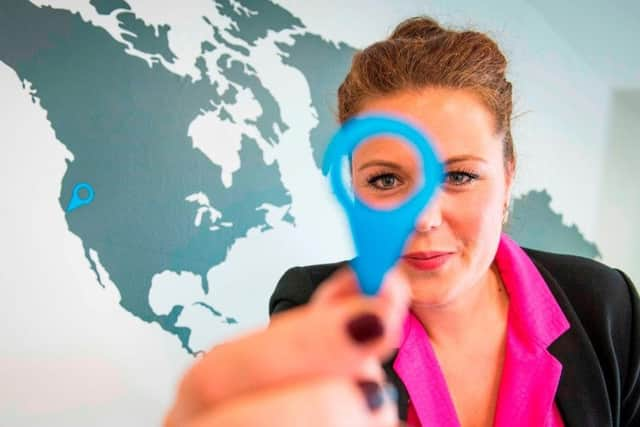Is Scotland an innovative nation?


Our nation is home to the scientifically proven travel pillow, Trtl, which was the brainchild of two Strathclyde University mechanical engineering students.
It’s the birthplace of Marty the Robot, designed to encourage children to choose STEM subjects at school, and it’s the country where partnership working has led to quirky collaborations such as tea-infused candles, whisky-infused tea and a craft brewery which has taken crowdfunding to a whole new level.
Advertisement
Hide AdAdvertisement
Hide AdIncubators, hatcheries and accelerator programmes are shaping the landscape in terms of guidance for early stage businesses and scale-ups, offering sector expertise, promising matchmaking services and funding opportunities. Succeeding in such a competitive ecosystem is no walk in the park.


According to Jim Duffy, co-founder of the Moonshot Academy which describes itself as the “next generation accelerator”, Scotland has no shortage of innovative ideas; the problem lies in transforming them into profitable businesses.
“Innovation is one of those overused words,” says Duffy, formerly co-founder and chief executive optimist at Entrepreneurial Spark.
“It’s becoming really trendy both in start-ups and in corporates, and around the university sector.”
He quotes one of America’s greatest inventors, Thomas Edison, who once said “genius is 1 per cent inspiration and 99 per cent perspiration.”


“I’m seeing a lot of 1 per cent ideas but not the 99 per cent and that’s where we are falling down,” says Duffy.
“Somebody might come up with an innovation team or an ideas hub or even a start-up but then they don’t do anything with it.
“That’s what people don’t
understand when we talk about innovation. Innovation is two pieces – it’s the idea and it’s the execution.”


Advertisement
Hide AdAdvertisement
Hide AdIt’s not that we lack awareness of the need to put in all the hard work. Changing people’s mindsets and shaping their thinking towards scaling up was something Duffy and the team at Entrepreneurial Spark were trying to do five years ago.
“I am still seeing the same blockages out there,” he says. “People can come up with ideas and then mug off investors because they don’t know how to act like a business in business terms.”
Support is available for what Duffy has termed “business builders” – entrepreneurs who are determined to make their idea a success.
There are the Scottish Government Innovation Centres which operate up and down the country, tackling specialist areas including aquaculture, construction and oil and gas.


Then there’s Scottish Enterprise, Scottish Development International, Codebase for the tech giants of the future and Interface to make sure the people with the ideas are linked up with the people with the relevant expertise. Elevator UK, BioQuarter, Censis and CREATe – the list is as good as endless.
The Moonshot Academy is the disruptor in the mix, with Duffy and co-founders Al Walker and Bill Morrow pledging to stay with a business for the long term, rather than accelerate them through an 18-month programme.
They’ll only partner with businesses which they believe have what it takes to make it.
“Investors, mentors and consultants are all doing a set amount of work within a defined period,” says Duffy. “Nobody is saying they want to get to know you and your co-founder really well. We will be with you in those meetings, sitting with you as your guardian angels.”
Advertisement
Hide AdAdvertisement
Hide AdFood subscription boxes were all the rage for a while, and dating apps had their day.
So what’s going to be the next big innovation to come out of Scotland?
“I’m not really seeing any fantastic, brilliant ideas,” says Duffy. “People are thinking more practically about what they can do.
“It’s not about changing the world. I think what people are doing now is working out clever little niches and they can own that with a view to somebody, at some point, buying them.”
With 50 per cent of new businesses tech related, robotics, data and analytics are still providing much of the inspiration. That’s supplemented by food and drink and people-centric ideas.
“We need to go back to the basics with things people can do with other people,” says Duffy.
“It might be a franchise-type business like a mums’ yoga meet-up or a swim club. I think tech will take us to a space where we will go back to wanting to deal with people again.”
Scotland is an innovative nation, but with “collaboration” very much the word of the moment, Duffy is encouraging entrepreneurs to look to London for ideas.
Advertisement
Hide AdAdvertisement
Hide Ad“I think you cannot get away from the size, scale, volume, energy, craziness of London and the money and potential investors that are down there,” he says, adding: “In London they are a bit more commercial.”
Matchmaking and collaboration is a theme that crops up again and again.
“That collaborative piece is an important skillset because a lot of entrepreneurs like to work on their own and keep their ideas to themselves.
“If they are willing to co-create, the energy that you bring in from other people buying into your idea is fantastic.”
Not every creative new businesses will be the next unicorn. For some, that’s simply not the right path.
But what’s lacking now, according to Duffy, is the signs of any ventures with the potential to rival Scotland’s giants.
“If you look at Skyscanner and FanDuel, where are the ten that are three years behind them? I would love to see that mapped.”
He does name-drop a couple of “ones to watch”, so to speak. First up there’s ZoneFox, which has been around since 2008 and is a market leader in user behaviour analytics, although it’s not quite a household name just yet.
Advertisement
Hide AdAdvertisement
Hide AdCally Russell’s online shopping app Mallzee has been dubbed the “Tinder of fashion” and started its story in Edinburgh, as did Leah Hutcheon’s appointment scheduling system Appointedd, which is going from strength to strength.
“I don’t think you should be telling everybody that they should be a Skyscanner or a FanDuel,” says Duffy.
“You should be encouraging people to build a business for the right reasons. They might want to become the big beast that investors want to own, but you have to be ready for that and want it.” With that in mind, is there a magic formula for succeeding in innovation?
“Build a solid business based on the 1 per cent and the 99 per cent, then focus on the 99 per cent,” says Duffy.
“Stop focusing on innovation and start focusing on innovation and business execution. Innovation is commercial, it’s not just about the creativity.”
The innovation conversation
In November 2013, the Scottish Government published Scotland CAN DO: Becoming a World-leading Entrepreneurial and Innovative Nation.
It was followed in 2014 by the publication of the Scotland CAN DO Action Framework and between them the documents set the ball rolling for a “shared statement of intent” thanks to partners coming on board to work towards a Scotland that is both entrepreneurial and innovative.
The innovation “conversation” has gathered pace since and now everyone’s talking about it, throwing the word around in relation to start-ups, scale-ups, spin-outs, internal workplace developments, marketing strategies and more.
Advertisement
Hide AdAdvertisement
Hide AdBut is it all talk and no action, or is Scotland embracing the concept?
There’s certainly a lot of work going on in the construction industry, in life sciences and in financial services.
Technology is proving its worth to banks and insurance firms which are developing new ways of streamlining processes, and there’s a real buzz of activity around the Edinburgh BioQuarter.
You only have to speak to an organisation like Interface to realise there are countless businesses looking for funding and expertise to enable product development, or visit a food market to see what’s going on with the street food revolution which is changing the way we eat, as well as what we eat.
Deloitte has its physical “Greenhouse” spaces which are designed to disrupt conventional thinking, inspire creativity and help bring about tangible solutions for clients.
Fellow Big Four accountancy firm PwC is also taking action on innovation. Working in partnership with CodeBase, it announced its ten-week SCALE: Edinburgh programme in August, which will identify and work with 12 established Scottish companies which are ready to scale up.
The aim is to support them from talking about scaling up to actually doing it, helping them gain traction, source commercial opportunities and secure additional funding.
Scotland’s universities are key players in driving innovation through research and development.
Advertisement
Hide AdAdvertisement
Hide AdIn August, Dundee University was announced as the highest-ranking UK institution for its role in influencing innovation so their hard work is not going unrecognised.
In fact, Universities Scotland has produced a five-point action plan setting out how they can work in partnership with business and support agencies to enhance the higher education sector’s innovation strategy.
It’s a collaborative plan, just like much of the work around innovation in Scotland. The overarching message is that innovation a) doesn’t happen overnight, and b) doesn’t happen alone.
Working together seems to be the secret to success, whether you are a business developing a new recipe or a management team looking for ways to increase productivity and profit by making the best use of employees’ skills and interests.